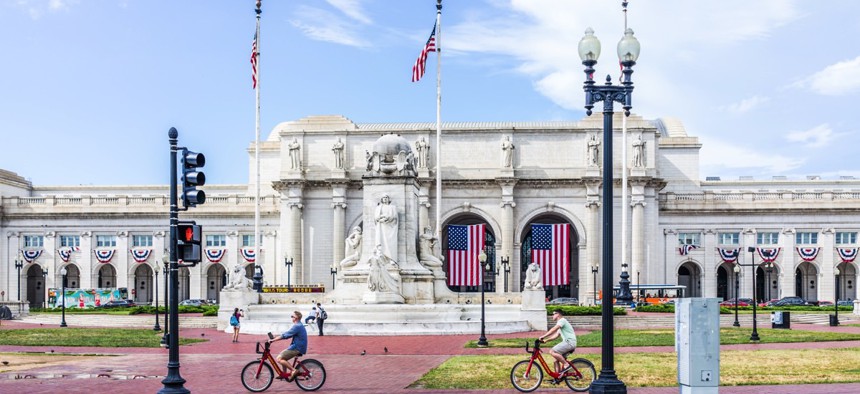How D.C. Wants to Use Bike-Share Data to Improve Equity

Bikeshare riders outside Union Station in Washington, D.C.
The city already requires operators to share real-time information on vehicle availability.
WASHINGTON — Electric scooter and dockless bike-share services are being adopted more readily by residents of D.C.’s low-income and majority black neighborhoods than regular bike share, according to an analysis of District Department of Transportation data.
Data company Populus used its Mobility Manager platform to evaluate information from operators like Lime, Bird, JUMP, and Spin and found African-American residents 2.6 times more likely to use the new dockless services than the city-sponsored bike-share program. It also found greater availability of dockless vehicles in neighborhoods across the city.
D.C. partnered with Populus beginning in July on a pilot looking to better understand the distribution and availability of vehicles across the city.
“At this point we’re not making programmatic or policy changes,” Stefanie Brodie, research program specialist with DDOT, told Route Fifty. “I think that dockless provides a wealth of data, and hopefully we’ll be able to use this in our planning efforts in the future.”
The District not only has a data-sharing agreement with Populus but requires bikeshare and e-scooter companies to provide data on vehicle availability in real time—available to the public through its open data feeds.
Populus is still in the process of providing feedback, but its general findings report is meant to help improve mobility throughout D.C. long term, with the goal of reducing inequities in accessibility by making better use of city data.
Data on demographic services are the hardest for cities to collect, but D.C. mandates sharing in its contracts with operators via static and real-time reports on vehicle locations. The latest push is for cities to request “breadcrumb” data on routes and trip trajectories, said Regina Clewlow, co-founder and CEO of Populus.
“Vehicles of the dockless programs are indeed more accessible in traditionally underserved areas,” Clewlow said.
Capital Bikeshare, which has dock stations across the D.C. region, controls bike distribution in the morning but not over the course of the day. Populus compared bike availability in underserved neighborhoods during the day to bike availability specifically in the morning hours.
Some cities have begun requiring or incentivizing operators to increase the percentages of bikes in particular neighborhoods where public transit is hard to access.
D.C. plans to put out a new draft policy in 2019, but for now Populus will continue its work there, as well as in places like Arlington County, Virginia, and Seattle.
Dave Nyczepir is a News Editor at Government Executive’s Route Fifty and is based in Washington, D.C.
NEXT STORY: Breaking down the barriers to an IoT-enabled government






